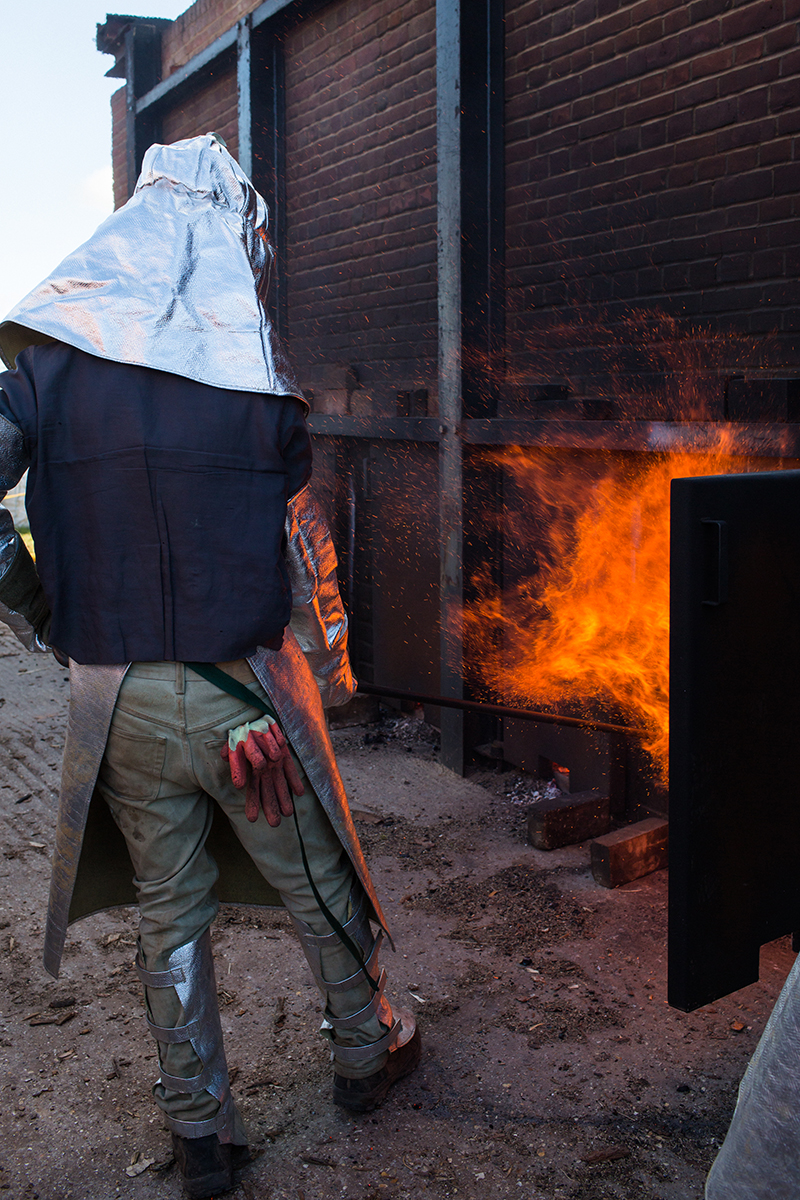
Can sustainably made bricks reduce building and demolition waste?
Jim Matthews, third generation owner of family run brick works H.G. Matthews, offers insight into how choosing bricks which have been wood-fired, a process which dates back to the 18th century, can offer massive sustainability benefits.
Sustainable brick manufacture
Brick making is estimated to be between 6,000 and 10,000 years old but a booming global population and associated development has led to brick production on an unprecedented scale and the inevitable consumption of massive amounts of energy. Indeed the Brick Development Association calculates the embodied carbon for brick to be 0.244 tonnes of CO2 per tonne of bricks (quarry to site).
H.G. Matthews is the only manufacturer of hand-made wood-fired bricks in Europe
The brick making industry, like other construction industries, is working hard to minimise its environmental impact and some brickworks are making real progress in turning brick manufacture into something more sustainable.
The process for making bricks is relatively straightforward: clay is dug, pugged, moulded, dried and fired. Traditionally this process was naturally far more sustainable than it is today. Clay would have been quarried very locally, bricks would have been air dried and then fired using wood from local woodlands. Now clay is often transported by road to brickworks and dried and fired using oil, gas or even coal.
Sustainability has always been at the heart of the H.G. Matthews business. In 1942, Henry George Matthews bought 400 acres of woodland and local countryside in order to supply the brickworks with clay. While initially a move to help keep costs low and the brickworks self-sufficient, this 91-year-old business decision has subsequently enabled the firm to become the only brickworks in the country _ possibly Europe – to make wood-fired bricks in a closed loop system.
Repairing prestigious buildings
As a specialist brickworks, our bricks are used to repair and extend some of the most prestigious buildings in England. In order to be able to offer authentic bricks we took the decision to produce a range of bricks fired in open clamps, using wood as the fuel. This method of production dates back to the 18th century and the process produces subtle colour variation as well as beautiful glazing which can be a perfect match for historic buildings.
We undertake clay digging on our own land, after receipt of planning permission from Buckinghamshire County Council and the nearby beech and oak woodlands and young broadleaved plantations on the estate have been marked for thinning with felling consent obtained from the Forestry Commission.
As well as providing us with wood to fire the bricks, this thinning process improves the condition of the woodland, letting light in and benefiting the ground flora and many species of wildlife. Not only that, but the thinning process also encourages natural regeneration, allowing saplings to take hold and grow. We have also developed a long term management plan for all the woods on the estate to ensure that wood fuel is produced on a sustainable basis.
In recent years, the company has planted over 25 acres of new broadleaf woodlands, on previous clay digging sites. Ponds and plants on the old site, a nearby farm, have also become a haven for wildlife helping to provide a habitat for local species.
Wood fired bricks
Unfortunately, the demands of modern construction combined with British weather mean that air-drying is simply not an option for the majority of the year in the UK and the drying of bricks using heated air remains energy intensive. To tackle this, in 2012 we took the decision to install five wood chip boilers to produce the heated air required to dry all our bricks _ not just those that would be wood fired. These attract the Renewable Heat Incentive payments and have replaced an older wood chip system, which replaced an oil system.
Our brick making process, especially for our wood fired bricks, is now highly sustainable. By combining the best of traditional techniques and the best of modern technology we have successfully managed to revive a lost skill to the benefit of architectural conservation and to the benefit of our local environment. However, it won’t stop there. As a business, we’re always looking for ways to make our operation more sustainable.
Latest news

21st February 2025
ASSA ABLOY EMEIA: Save valuable time and money with a seamless switch to programmable digital keys
In 2025, access management can be a whole lot easier. By making access part of their digital processes, businesses can put time-consuming key management and the cost of changing the locks firmly behind them. Making this switch is a lot easier than many people think, as ASSA ABLOY explains here…
Posted in Access Control & Door Entry Systems, Architectural Ironmongery, Articles, Building Industry News, Building Products & Structures, Building Services, Doors, Facility Management & Building Services, Health & Safety, Information Technology, Innovations & New Products, Retrofit & Renovation, Security and Fire Protection
21st February 2025
Showersave supports industry leaders in addressing Part L and Part G regulations
Showersave has sponsored and participated in a recent Building Insights LIVE roundtable on ‘Water & Energy Saving Innovations in New Build Housing’.
Posted in Articles, Bathrooms & Toilets, Bathrooms, Bedrooms & Washrooms, Building Associations & Institutes, Building Industry Events, Building Industry News, Building Products & Structures, Building Regulations & Accreditations, Building Services, Exhibitions and Conferences, Interiors, Pipes & Fittings, Plumbing, Retrofit & Renovation, Sustainability & Energy Efficiency
21st February 2025
GEZE: The importance of Specifying High Quality Door Closers on Fire Doors
Andy Howland, Sales & Marketing Director at GEZE UK, discusses why specifying high quality door closers on fire doors is important…
Posted in Access Control & Door Entry Systems, Accessibility, Architectural Ironmongery, Articles, Building Industry News, Building Products & Structures, Building Regulations & Accreditations, Building Services, Doors, Facility Management & Building Services, Health & Safety, Posts, Restoration & Refurbishment, Retrofit & Renovation, Security and Fire Protection
21st February 2025
Insight Data achieves ISO9001 recertification with zero non-conformities
Leading industry data specialist, Insight Data, has successfully achieved the prestigious recertification for ISO9001 with zero non-conformities for the fourth consecutive year.
Posted in Articles, Building Industry News, Building Regulations & Accreditations, Building Services, Information Technology, Research & Materials Testing
 Sign up:
Sign up: